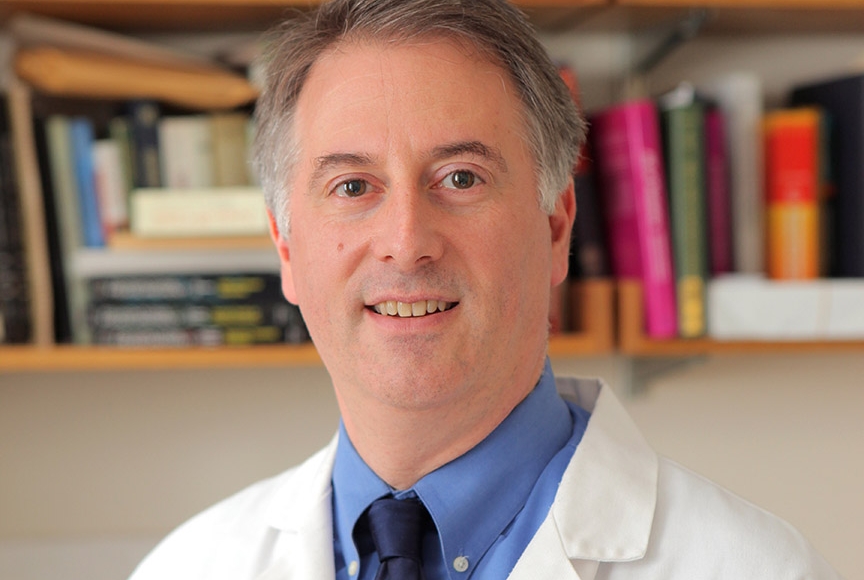Better Understanding of Mind Could Help More Brain-Injured Patients
Hundreds of thousands of people who have suffered traumatic brain injuries in the United States languish in an amorphous, heartbreaking state of being, in which their level of consciousness is unclear and their options for treatment and care sparse. But new research by Weill Cornell Medical College could improve these patients' lot — by clarifying how to accurately measure their level of awareness so that more people who could be helped by rehabilitation are identified.
The international, eight-center study, led by Dr. Nicholas Schiff, the Jerold B. Katz Professor of Neurology and Neuroscience in the Feil Family Brain and Mind Research Institute, will try to reconcile the images on patients' brain scans with their actual function. Physicians typically characterize patients' consciousness by observing their behaviors, a practice that is subjective and inconsistent. Understanding the meaning of brain scans, captured by magnetic resonance imaging (MRIs), electroencephalography (EEG) and other technology will help physicians gage the consciousness of the 425,000 people annually who are moderately or severely brain injured, Schiff says — as well as those whose awareness is unknown because they are in intensive care units or are suffering the effects of neurodegenerative illnesses that typically strike the elderly. The study is backed by a $5 million grant from the James S. McDonnell Foundation, a philanthropy based in St. Louis that funds scientific research, including studies of human cognition.
"We're really interested in how to use measuring tools to identify consciousness when the bedside examination is an unreliable gage," says Schiff, who is also the director of Weill Cornell's Cognitive Neuromodulation Lab. "The problem we're going after here is one everyone should care about: If as a result of, for example, a stroke, or a car accident, you can't move to indicate you are aware, you will want people to know under those circumstances that you're conscious — that's the problem we're trying to solve."
Distinguishing between disorders of consciousness is a particularly vexing problem for patients and their families. Minimally conscious state — in which patients inconsistently demonstrate awareness by tracking objects or people with their eyes, following simple instructions and communicating using gestures, individual words or phrases — is distinct from vegetative state, in which patients lack awareness but may open and close their eyes. Yet some 41 percent of people deemed to be in a persistent vegetative state may actually have some awareness, according to a 2009 study in BMC Neurology. Some 10 percent of them ultimately improve. And an overwhelming majority of patients whose state of consciousness is unclear — 89 percent — also are minimally conscious, the study found, underscoring the relationship between patients being accurately diagnosed and getting better.
But because of limited diagnostic codes for consciousness disorders and lack of expertise around how to treat them, patients have constrained access to rehabilitation and assessments of their consciousness, Schiff says. In addition, over 95 percent of government funding of brain-injury research supports inquiries into mild injuries, such as concussion. As a result, those who are in custodial care because they are presumed to be beyond help and may actually benefit from rehabilitation are not the subject of many studies, Schiff says.
"We see them at the end-of-life care spectrum, and it means they don't receive the care they need," says Dr. Joseph Fins, chief of the Division of Medical Ethics and the E. William Davis, Jr., M.D. Professor of Medical Ethics, who will study how best to translate the ethical aspects of the research to patients and policymakers. "We try to overcome the presumption of futility, the disqualification from the best of medicine, and reconfigure research ethics so that if we make discoveries, patients and families will benefit from them.
"We need to recognize people's consciousness — that it is a civil right," adds Fins, whose upcoming book on the issue, "Rights Come to Mind: Brain Injury, Ethics & The Struggle for Consciousness," will be published next year by Cambridge University Press. "It's the next wave of the disabilities-rights movement."
Schiff is a leading figure in the study and treatment of consciousness disorders. Along with other scientists who are part of the study supported by the McDonnell Foundation, Schiff pioneered the use of deep-brain stimulation to help some brain-injured patients regain the ability to speak and eat. This new study, which brings together leading research teams from the United States, England, France, Belgium, Canada and Israel, is a unique collaborative aimed at sharing knowledge, expertise and data. It will include the creation of an open-source database of measurements of both healthy and consciousness-disordered people, part of an increased use by physicians of computational and mathematical tools to improve health care and better understand complex systems, be they neurons or patients.
"There is no middle ground here and much is at stake," says Susan Fitzpatrick, vice president of the McDonnell Foundation. "Science must get it right if we want to both advance our understanding of how the brain works and serve the needs of the most vulnerable population of patients and their loved ones. The collaborative effort centered at Weill Cornell has the intellectual firepower and the clinical compassion needed to tackle this difficult work."

